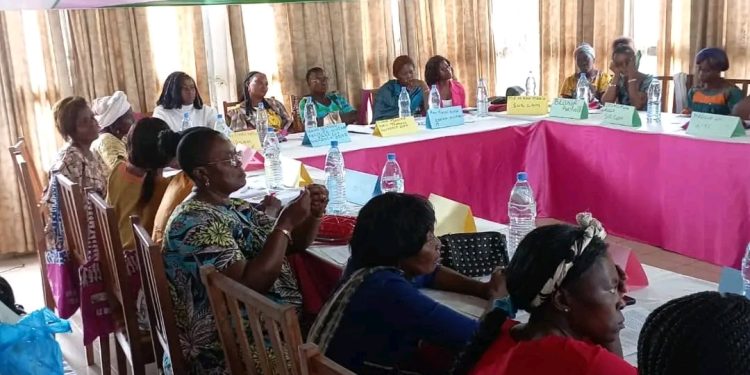Story, Louvier Kindo Tombe
Few meters away from her home in Apouh, a locality in Edea 1 Sub Division, Sanaga Maritime Division of the Littoral region of Cameroon is situated a mighty palm tree. Madam Eloga Augustine, will alway grumble when ever she sees the palm fruits fall off the tree that belong to Socapalm, an agroindustry in Cameroon specialized in palm oil production. She has been prevented even from picking up the fallen fruits, like many of her peers.
“Anyone seen picking up palm nuts in the Socapalm plantation will be arrested, some of us even end up in prison,” Madam Etonde Mbella Marie Noëlle said.
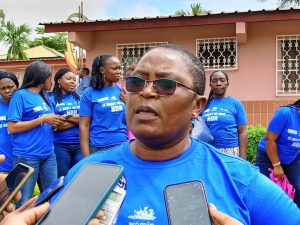
She is national president of SYNAPARCAM, women’s wing. Just like her, many are those who have been prevented from having access into the plantation.
On Wednesday April 12, 2023, the population of Apouh village left their usual hustle and bustle and staged a public demonstration against the activities of Socapalm in their village. They carried placards with messages addressed to the management of Socapalm.
The chief of Apouh village, His Majesty DITOPE LINDOUME, who was at the head of the demonstration received a convocation from officers of the Edea gendarmerie brigade. Upon arriving the station, he was immediately transferred to the Edea central prison.
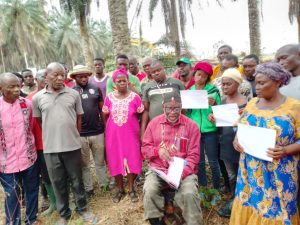
“My father spent the night in prison for what I can’t really explain here,” a prince from Apouh told News Upfront.
Most of those affected are women. Infact, as soon as women stand up to denounce abuses and demand their rights, they are threatened and arbitrarily detained, which plunges them into fear and forces them to remain silent. The women are now afraid to speak out after receiving a very threatening communiqué from an authority to prevent them from expressing their anger at the abuses to which they are being subjected.
In Cameroon, most local residents around agroindustries are going through difficult moments as their rights are been denied them. There is however hope in the horizon as civil society organizations are mobilizing to train them on their “rights to say no”.
“We are not at home in our homelands, our lands are polluted by these agroindustries who care less about our wellbeing,” another local resident whose community is suffering from the effects of an agroindustry told News Upfront.
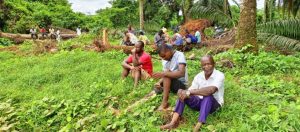
Jean Paul Sartre said, “To be free is to know how to say no”. To oppose is therefore to be free, free to do or not to do, and above all free not to let things happen. It’s the first act of freedom and independence from others. Unfortunately, most women living near large monoculture plantations regularly see their freedom curtailed, as fear prevents them from saying NO.
The rights to say no: communicate, influence, change lives
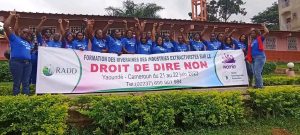
For more than 5 years now, RADD, GDA and other Cameroonian and international civil society organisations have been working tirelessly alongside these women to help them defend their rights. No to the gender-based violence of which they are victims, No to the monopolisation of the land of their ancestors by large companies under the complicit gaze of decision-makers, No to all abuses and violations of their fundamental rights.
Civil society organization – WoMin, network of sustainable development actors – RADD and Green Development Advocate – GDA, organized a training course on the RIGHT TO SAY NO for 27 women living near 11 agro-industrial sites and project zones in Cameroon. The training took place in Yaounde from June 22-23, 2023.
“The women learnt that it is right for them to protest and make proposals to better their conditions,” MBA MBIA Danielle, workshop trainer, Green Development Advocates (GDA) said.
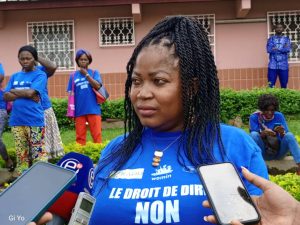
The awareness of these local residents is not enough to restore their dignity, which has been trampled underfoot by these agro-industries.
“It is time to take action, we can not only seat and be remote controlled,” Marie Crescence Ngobo, Executive Secretary of RADD, told reporters at the end of the Yaounde training.
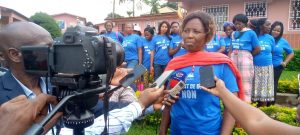
“The overall objective was to build women’s capacity to understand and defend their rights in the agro-industry and other project areas in Cameroon”.
Participants at the training were given tools available to women to enable them to say NO to threats from the public authorities, schooled on how can they be supported in their positions, because their freedom and well-being depend on it.
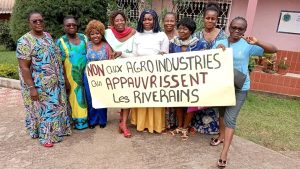
The participants sent out special messages to the powers that be, some saying their environment is their pharmacy.
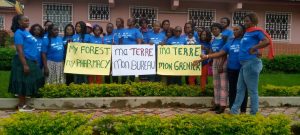
With their land taken over, their water polluted and their forests totally destroyed, the local people, as rural dwellers, have been deprived of their main resources, without any compensation. The promoter of RADD said “That is why they need to act, and now”.
